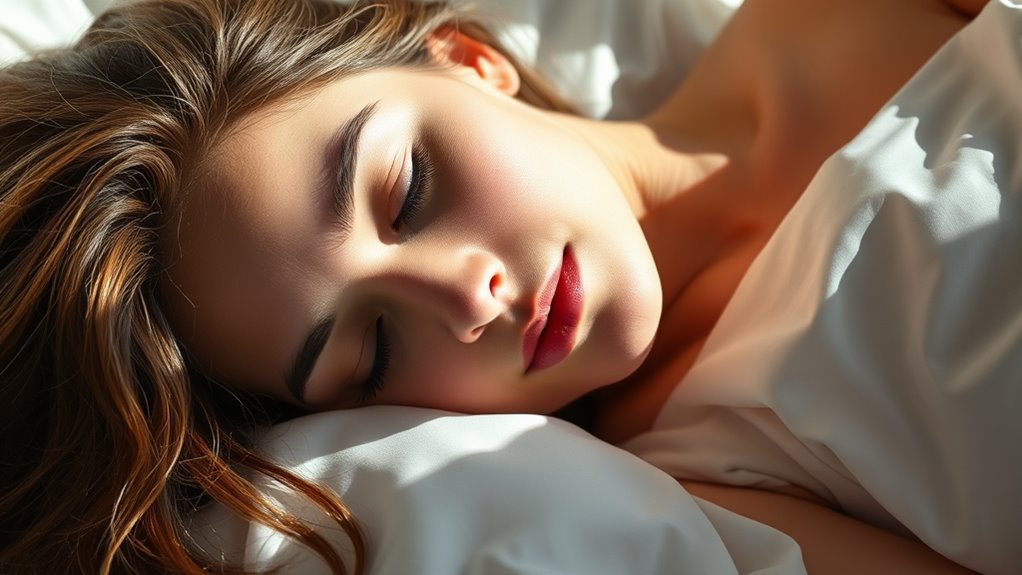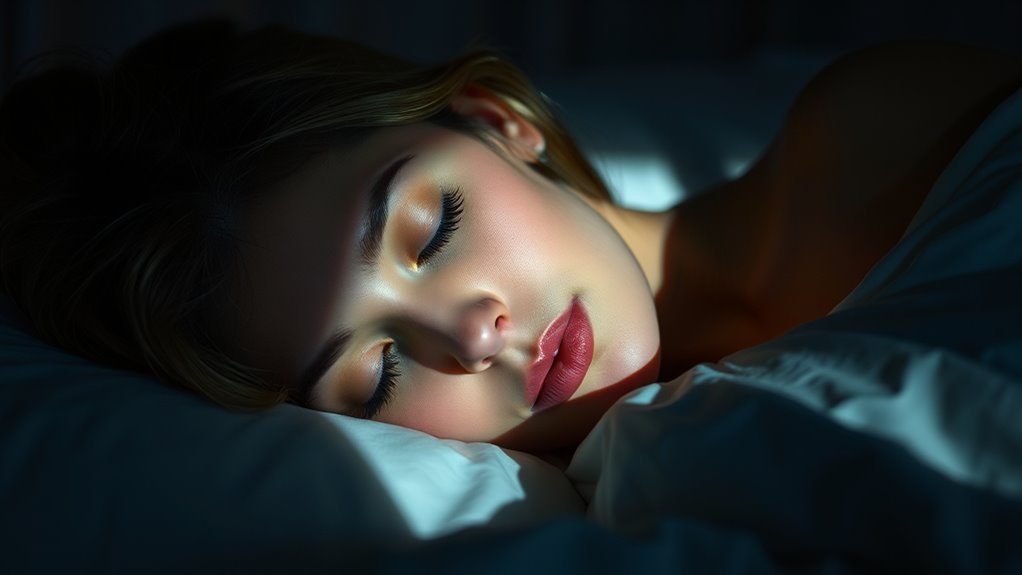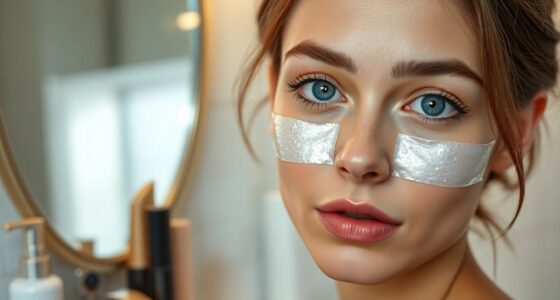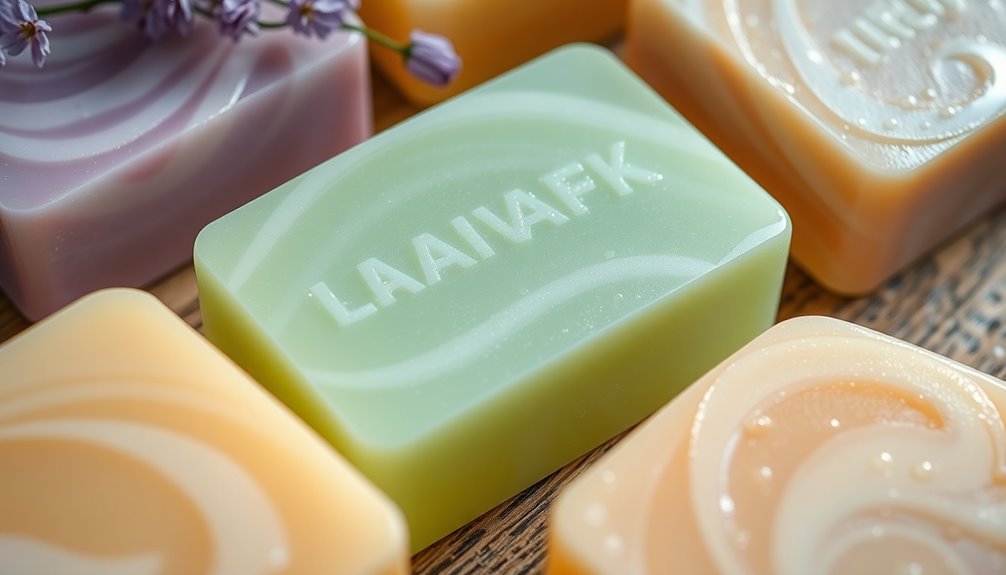Beauty sleep is definitely a must for healthy, glowing skin. When you get enough quality rest, your skin repairs itself, boosts collagen, and recovers from daily damage. Sleep also helps your skincare products work better and reduces signs of aging like dark circles and dullness. Skimp on sleep, and your skin suffers—becoming dull, irritated, and less resilient. Want to discover simple ways to improve your sleep and gain access to better skin? Keep exploring to find out more.
Key Takeaways
- Adequate sleep boosts collagen production, essential for skin elasticity and youthful appearance.
- Sleep deprivation impairs skin’s ability to repair, leading to dullness and premature aging.
- Quality rest enhances skincare product absorption and overall effectiveness.
- Lack of sleep causes dark circles, puffiness, and increased vulnerability to environmental damage.
- Prioritizing 7-9 hours of sleep supports healthy, resilient, and radiant skin.

Many people believe that getting enough sleep is essential for looking and feeling their best, but is “beauty sleep” truly a myth or a must? The truth is, sleep plays a vital role in maintaining healthy, glowing skin. When you don’t get enough rest, sleep deprivation sets in, and it shows—your skin can look dull, tired, and aged beyond your years. This isn’t just about feeling sluggish; it’s about your skin’s ability to recover and repair itself. During deep sleep, your body ramps up production of collagen, a protein responsible for skin elasticity and firmness. Without enough sleep, this process slows down, leading to increased fine lines and sagging over time.
Prioritizing quality sleep is essential for radiant, youthful skin and overall wellbeing.
Your skincare routines are most effective when paired with quality sleep. No matter how many serums or creams you slather on, if you’re sleep-deprived, those products can’t do their best work. Sleep deprivation hampers your skin’s ability to absorb nutrients and regenerate cells. It also causes blood vessels beneath your skin to dilate, leading to dark circles and puffiness that no concealer can fully hide. Over time, chronic lack of sleep can weaken your skin’s barrier, making it more susceptible to environmental damage and irritation.
Getting consistent, restorative sleep isn’t just about feeling rested; it’s about giving your skin the time it needs to repair damage from daily stressors like pollution, UV rays, and makeup. When you prioritize sleep, you allow your skin’s natural processes to work efficiently. This means clearer, smoother skin, fewer breakouts, and a more radiant complexion. If you’re skipping out on sleep regularly, you may find that your skincare routines aren’t producing the results you want. That’s because sleep deprivation can hinder the effectiveness of even the most advanced skincare products.
To maximize your skin’s health, aim for 7 to 9 hours of quality sleep each night. Create a calming bedtime routine, avoid screens before bed, and keep your sleeping environment cool and dark. Remember, skincare isn’t just about what you put on your face; it’s about what you do for your body as a whole. Proper sleep supports your overall health and ensures your skincare efforts aren’t wasted. Recognizing the role of sleep in skin health can help you make better choices for your beauty routine. So, the next time you think of “beauty sleep” as just a catchy phrase, recognize it as a crucial part of your skincare routine—one that can truly transform your skin’s appearance and resilience.
Frequently Asked Questions
Can Sleep Position Affect Skin Aging?
Your sleep posture definitely influences skin aging, especially wrinkle formation. Sleeping on your side or stomach can cause creases on your face that may turn into wrinkles over time. To minimize this, try sleeping on your back to keep your skin smooth and reduce pressure. Changing your sleep posture can help protect your skin’s elasticity and prevent premature aging, giving you a healthier, more youthful appearance.
Does Drinking Water Improve Sleep-Related Skin Benefits?
Imagine your skin as a delicate sponge, craving hydration benefits overnight. Drinking water boosts your water intake, helping your skin stay plump and glowing. Proper hydration supports skin repair and reduces dryness, making your sleep more restorative. By staying well-hydrated, you release the full potential of your sleep, enhancing skin health from within. So, sip water regularly, especially before bed, to maximize those precious sleep-related skin benefits.
Are There Specific Bedtime Routines for Better Skin?
You can improve your skin by establishing specific bedtime routines. Incorporate relaxing rituals like gentle nighttime skincare, which helps remove dirt and excess oils, and promotes skin renewal. Creating a calming environment, such as dim lighting or aromatherapy, can signal your body it’s time to unwind. Consistency is key; sticking to these routines helps your skin regenerate overnight, leaving you with a healthier, more radiant complexion.
How Does Sleep Quality Influence Skin Hydration?
Oh, the grand mystery of how your sleep quality affects skin hydration—fascinating, right? When you sleep poorly, your hydration levels plummet faster than your phone battery before a night out. Poor sleep hampers your skin’s ability to retain moisture, leaving you with dry, flaky skin and compromised moisture retention. Prioritize quality sleep to boost your skin’s natural hydration, ensuring it stays plump, smooth, and glowing—no magic potion needed.
Can Sleep Deprivation Worsen Skin Conditions?
Sleep deprivation can definitely worsen skin conditions. When you don’t get enough rest, your skin’s repair process slows down, leading to increased inflammation and irritation. This can make conditions like acne, eczema, or psoriasis worse. Lack of sleep also reduces collagen production, causing sagging and fine lines. So, if you’re constantly sleep-deprived, your skin suffers more, and existing skin conditions may become more severe. Prioritize good sleep for healthier, calmer skin.
Conclusion
So, is beauty sleep just a myth or truly a must? The truth is, prioritizing good sleep isn’t just about feeling rested—it’s your skin’s best friend. When you sleep well, you give your skin time to repair, stay radiant, and fight off aging signs. Isn’t it worth making sleep a non-negotiable part of your skincare routine? After all, looking good starts with feeling good from the inside out.










